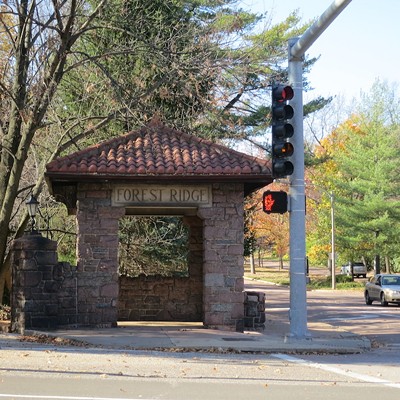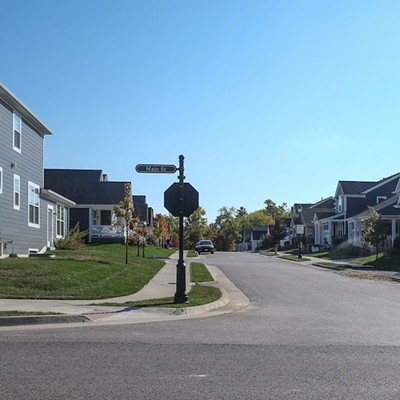St. Louis' population decline is often talked about in the context of the city's population peaking shortly after World War II and then dropping steadily in the seven decades since. But Saint Louis University professor and demographer Ness Sándoval says that to only focus on the city is to miss the bigger issue bedeviling St. Louis, and that is people leaving the region altogether — specifically, Black families. Sandoval talked to the RFT about why this is happening, where they're going and why it matters.
This conversation has been edited for length and clarity.
Last year, you spoke to the Board of Alderman about the city's population loss, saying that while St. Louis is gaining single people and couples with no kids, Black families were leaving, causing a net population loss. Where are the Black families going?
They're moving out to St. Charles, to some extent. Definitely St. Louis County. A little bit to Jefferson, but not much. But I always say this city-county boundary, for me as a demographer, is really a fake boundary, there's constant movement [back and forth] everyday. So when you see population loss in the city, and they're just moving half a mile to the county, that's not a concern at all.
It's when the families start leaving the region, then you have to start to realize you cannot be a major metropolitan region and say that you're going to grow if you have a declining Black population. I can't think of one region that claims to be a major metropolitan region, that's a destination, that has negative growth in the Black population.
So the city versus county framing on this is perhaps not the most helpful, you're saying?
The city gets a bad rap. Because it's always, "Oh, the city! The city!" But the county is smaller in 2023 than it was in 1990. And nobody talks about it at all. I think you need to hold the leadership in the county accountable. Because they have failed.
I live in Chesterfield. There are issues in the county that are problematic as well. But people seem to give it a pass. "Well, it's the city's fault." It's very complicated. But I'll tell you right now, the county is in big trouble. It leads the state in people dying compared to people being born.
Missouri is showing up as losing Black population precisely because St. Louis County is losing its Black population. So the state has every reason to be concerned or should be concerned at what's happened to St. Louis County, because the losses are so great that it's making the state number look bad.
You have spoken about people who leave the region going to places like Dallas, Charlotte, Atlanta. Why are folks headed south?
Access to opportunity. With the opening of the South — especially Atlanta, Orlando, Charlotte — when these opportunities emerged to move there, and you realize, “I don't have to live in a segregated neighborhood. I can live in an integrated neighborhood.” I think most young people [living in a place like St. Louis] are going to say, "I'm out."
Dallas, San Antonio, Austin — these cities evolved after 1970 after the Supreme Court ruled that segregation was illegal. So there was not a history of segregation in the city and the housing market with [restricted] covenants. They kind of started off with a very different infrastructure than St. Louis.
What are some things we can do to reverse all this?
We do not tell our story very well. I'm from Nebraska. I've lived in California and D.C. The St. Louis region itself has a lot to offer. But if you always lead with "the cost of living," you're going to lose the majority of people. What I try to tell people is that cost of living is the last thing this younger generation looks at. My students graduating SLU are going to San Francisco, and are willing to spend $8,000 a month to live there. Because it's San Francisco. The cost of living is not even a factor. They want to live in the Bay Area. They want access to the mountains and are going to go to Denver and they're willing to pay for it. And so when you lead with "you can live here cheaply," that's not the calling card for this generation.
I know your expertise is demographics, not PR. But what would be a better story than living cheap?
We don't tell our story about what you can do recreationally here in the region. We don't talk about the water access that we have to the rivers, the hiking activities that are around us. There should be some marketing saying that we're the 25-minute city. I had a meeting in Downtown yesterday, and even in rush hour I was home in 25 minutes in Chesterfield. That was a traffic jam for me. We don't tell that story.
You spoke to aldermen. I've heard you on the radio. You're speaking with me. Do you feel like the people in power are taking what you say seriously? Will they act on it?
It's not like people are not aware of these issues. You have the International Institute, the Mosaic Project, that are trying to create marketing programs to bring Latinos to the region. This was not an issue that was created today. These challenges were present in 1990. You made this comment, like, “Oh, people just shrug it off.” That's what happened in 1990. If I was a demographer in 1990, I would have been ringing the alarm bells. Because it was there in 1990. That St. Louis, of all the metropolitan regions, was the anomaly. And nobody did anything.
And maybe the Bosnian population in the 1990s bought our demographics a little time?
Not really. I mean some time, but not much. But there was no concern. By 2000, the governor should have got involved and said, “Because St. Louis is so important to the state, we need to figure this out now.” You needed to intervene 20 years ago. Any benefits we see from what we're doing today, it's probably a decade away.
And it's coming. The Latinos are coming. But what we're doing today should have
happened in 1990.
Subscribe to Riverfront Times newsletters.
Follow us: Apple News | Google News | NewsBreak | Reddit | Instagram | Facebook | Twitter | Or sign up for our RSS Feed

















